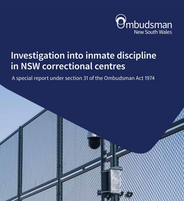The NSW Ombudsman has tabled a special report titled Investigation into inmate discipline in NSW correctional centres in Parliament on 21 August 2024.
The report follows an investigation involving a systemic examination of how inmate discipline is managed across all correctional centres. The inmate disciplinary system deals with inmates who are alleged to have committed a ‘correctional centre offence’ while in custody.
The investigation carried out a trend analysis of the more than 57,000 inmate discipline charges determined between 2018 and 2023, and conducted an in-depth review of a sample of over 350 individual determinations.
In addition to the immediate penalties that can be imposed, including reprimand, withdrawal of privileges (such as visits), and confinement in cell, a finding of guilt can negatively affect an inmate in other ways. For example, an inmate’s disciplinary record can affect decisions about security classification, impacting the inmate’s placement and treatment, as well as parole decisions, which can ultimately affect the time the inmate will spend in custody.
The NSW Ombudsman’s investigation found a systemic failure across all correctional centres to follow the requirements of the legislation and the relevant policies in relation to inmate discipline.
“In many cases, the systemic failure we investigated is leading to unjust outcomes and potentially unlawful decisions,” said NSW Ombudsman, Mr Paul Miller.
“This is compounded by the fact that inmates currently have no external review rights on a disciplinary determination other than the theoretical possibility of applying to the Supreme Court for judicial review, while internal reviews are limited in scope, legally uncertain and largely inaccessible.”
The NSW Ombudsman has recommended a comprehensive review of the inmate discipline system in NSW, including legislative change, to improve its fairness and effectiveness.
“Reform should include the introduction of legislated internal and external appeal rights in respect to both findings and penalties, as well as the strengthening of current processes to ensure they comply with legislation,” said Mr Miller.
“There is also a need for the development of a comprehensive and continuous quality assurance program to underpin correct and consistent decision-making.”
To read the full article, kindly click here.
Source: Ombudsman New South Wales, Australia

